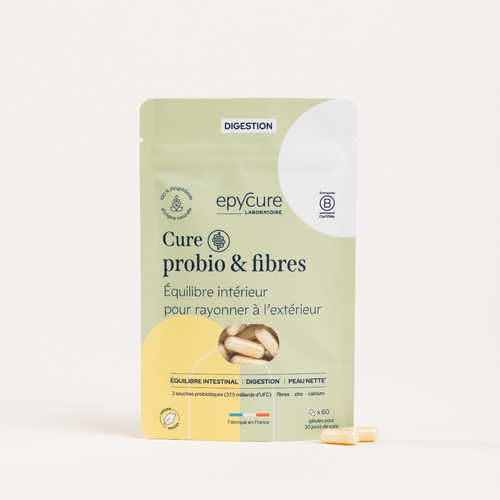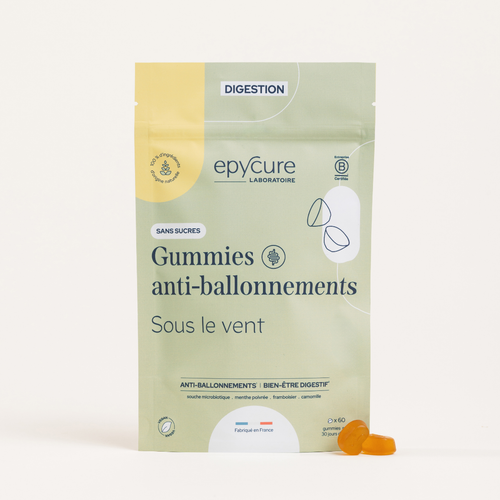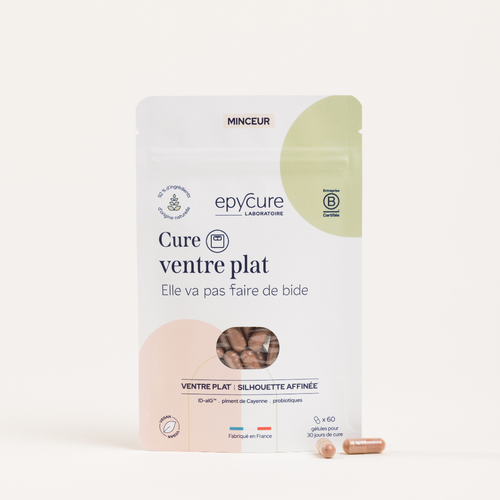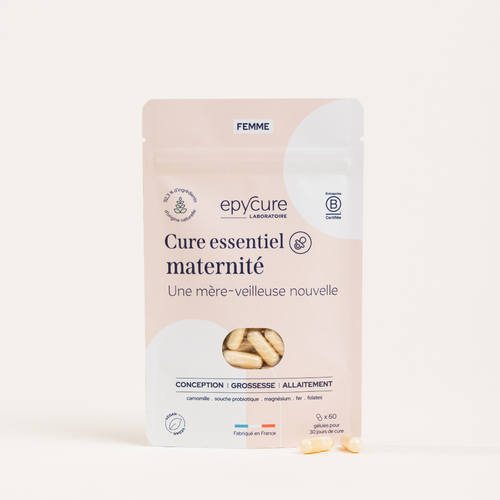What are probiotics?
These are all the living microorganisms that form the different flora of our body (oral, intestinal, cutaneous and vaginal) having a beneficial effect on the body. To put it simply, they are the positive bacteria in our intestines .
Probiotics will form, with other bacteria, a group of microorganisms called the “ human microbiota ”. Considered as an organ in its own right, its action is based on the balance between good and bad bacteria , this is what is called “ symbiosis ”. This symbiosis, a sign of good intestinal health, could be altered by a proliferation of bad bacteria , then causing an imbalance of the microbiota, called “ dysbiosis ”. This imbalance can be the cause of certain health problems such as infectious or chronic diseases like Crohn’s disease, ulcerative colitis or irritable bowel syndrome (IBS). The presence of probiotics in the intestine therefore helps maintain the balance of this flora by preventing and countering attacks from harmful bacteria.
Which probiotics for which benefits?
Over the years, probiotics have become a standard for health care. Today, the most studied and used genera are Lactobacillus and Bifidobacterium for their many benefits:
-
Better digestion : Probiotics will contribute to the digestibility of dietary fibers, which are not digested by the small intestine. They then allow optimal assimilation of nutrients , a factor influencing digestion. We find in particular the strains Bifidobacterium lactis LMG-21384 and Bifidobacterium breve DSM16604 in synergy in our Probio & Fiber Cure , whose effectiveness has been clinically proven in improving intestinal transit with a reduction in gastrointestinal discomfort .
-
Strengthened immune system : Approximately 70% of immune cells are present in the intestine. These “collaborate” with the microbiota to identify pathogenic bacteria and prevent them from proliferating. These include the strains Lactobacillus plantarum LMG P-21020 and Lactobacillus rhamnosus DSM 16605, clinically proven to strengthen natural defenses and reduce the duration and intensity of acute respiratory infections during winter.
-
Weight regulation : The Bifidobacterium breve DSM 16604 strain has also shown very positive results in reducing body fat percentage by acting on the production of CLA, fatty acids that will help burn fat , but also on the reduction of ghrelin (appetite hormone) and the simulation of leptin (satiety hormone). This is why we have selected it for the formula of our Flat Belly Cure , by combining it with two active ingredients clinically proven in weight control: ID-alG™ (marine algae and grape seeds) and cayenne pepper, for a 100% natural fat-burning and anti-bloating action.
-
Dermatology and skin aging : We again find the strains Bifidobacterium breve DSM16604 and Bifidobacterium lactis LMG-21384, for their benefits on the beauty of the skin, and more particularly on the soothing of atopic dermatitis and rosacea , or for their antioxidant properties, which will act against premature aging of the skin .
-
Pregnancy : During pregnancy, hormonal fluctuations can disrupt the intestinal microbiota, potentially leading to dysbiosis. To remedy this, it is recommended to consume probiotics for both the mother and the child. Indeed, they are particularly useful, both for relieving digestive discomfort in the mother-to-be , and for the development of the baby's immune system . The Lactobacillus rhamnosus GG strain has therefore been selected for the formula of our Essential Maternity Cure in order to prevent and relieve the ailments linked to this imbalance.
Foods naturally rich in probiotics
While taking probiotic supplements is an effective and practical solution to integrate into your daily life, it is also perfectly possible to consume them directly on your plate! To lend a hand to the good bacteria, naturally present in the body, we find foods such as fermented vegetables (sauerkraut, kimchi, pickles, etc.), yogurt and cheese , kombucha , milk or fruit kefir or even sourdough bread .
And what about postbiotics?
Just like nutrients in cooking food, the higher the temperature, the more vitamins and minerals the food loses. Probiotics are living microorganisms and are therefore ineffective in gummies since the manufacturing of the latter requires heating the pectin to encapsulate the active ingredients , thus destroying all living organisms.
There are, however, microbiotic strains that are effective in both their live and inactivated forms , otherwise known as “ tyndallized .” These are called “ postbiotics .” These microbiotic strains are sterilized, making them resistant to higher temperatures without losing their benefits . This is particularly the case with the Bifidobacterium breve DSM 16604 strain, in its tyndallized form, which we have added to our Anti-Bloating Gummies.
What are prebiotics?
Not to be confused with probiotics, prebiotics will constitute their food , due to their high richness in dietary fiber , and are therefore essential for their proper functioning. Indeed, they promote the diversity of bacteria present in the intestine and ensure their proper development , to the detriment of pathogens. Their consumption contributes to the balance of our intestinal flora and therefore to our health.
As complex carbohydrates, our body alone does not have the capacity to digest or absorb them. They will therefore be directly put in contact with beneficial bacteria to be digested and broken down, thus providing a double action: digestion of fibers and growth of probiotics . By feeding on these dietary fibers, probiotics will grow faster, diversify and therefore increase the health benefits. Prebiotics will therefore help maintain a healthy intestinal barrier , regulate the absorption of nutrients by the colon , strengthen our natural defenses and reduce digestive disorders .
Which foods are sources of prebiotics?
Fructo-, gluco-, or galacto-oligosaccharides (FOS & GOS) are the most well-known and studied prebiotics today. As explained above, prebiotics are mainly found in foods rich in fiber (asparagus, bananas, leeks, squash, beans, etc.), omega-3 and 9 (olive oil, avocado, oily fish, etc.), and polyphenols (spices, red fruits, dried fruits, etc.).
Our Probiotic & Fiber Cure contains a natural prebiotic from agave, inulin , rich in dietary fiber, which will serve as food for intestinal bacteria while releasing molecules beneficial for health . Present very widely in the plant environment, it has demonstrated a remarkable effect on the regulation of the intestinal microbiota .
What are symbiotics?
To put it simply: probiotics + prebiotics = symbiotics .
Indeed, symbiotics are the synergistic association of probiotics and prebiotics for a complete action on the health of our intestinal flora . This synergy allows the continuity of the probiotic and thus increases its biological properties by feeding directly on the prebiotic.
How to choose the right probiotics?
While probiotics address a multitude of issues, it's not always easy to make the right choice with the growing selection of dietary supplements on the market. To help you make the right choice, we're sharing 6 tips for choosing your probiotics :
-
Prefer multi-strain supplements to single-strain supplements
There are mainly 4 genera of probiotic strains: Lactobacillus , Bifidobacterium , Streptococcus and Lactococcus . For each genus, there are thousands of different species and strains, each acting on a specific health problem. It is not essential to combine several strains in the same formula but it is strongly recommended since each individual is unique . Indeed, the action of a probiotic can differ from one person to another . Therefore, a multi-strain supplement not only addresses different issues but also suits the majority of individuals , and therefore increases the chances of getting better !
-
Favor scientifically proven strains
When Hélène, our super R&D Manager, develops formulas, one of the major criteria in the choice of active ingredients is the presence of scientific or clinical proof . Probiotics are no exception, being the subject of numerous studies, due to their growing notoriety, which guarantees their effectiveness on the different problems studied .
-
More CFUs does not mean more effective!
What is CFU? This term stands for Colony Forming Unit and is used to estimate the number of bacteria present in the medium being studied.
It is often thought that the greater the quantity of CFU , the more effective the supplement will be . In fact, the majority of studies evaluate the effectiveness of probiotic strains between 5 and 10 billion CFU: Lactobacillus strains have demonstrated their effectiveness between 5 and 40 billion CFU while Bifidobacteria between 1 and 40 billion CFU. However, for each strain, the goal is to have the right dose demonstrated by its clinical study. An overdose will therefore not necessarily have more effect than the “optimal” dose, studied and scientifically proven.
However, overdosing can be useful in the production of probiotic supplements since, due to their “fragile” nature which tends to degrade over time , the strains can be supplied at higher doses to guarantee minimum effectiveness throughout the minimum product durability (MDD) .
-
Choose probiotics with 100% transparent traceability
It is important to choose a fully determined strain , meaning that its genus , species and identification number are defined and that it corresponds exactly to the strain evaluated in clinical studies. Not all probiotics of the same genus and/or species necessarily have the same properties, so their identification is essential. At Epycure, we have made it a point of honor to know the exact determination of each strain that we select, which is not always the case for all supplements on the market.
-
Favor symbiotic complexes
As explain Previously, symbiotics are the association of probiotics with prebiotics. This synergy allows to bring all the benefits of good bacteria , while ensuring their good development for a balanced microbiota . As you will have understood, our Probio & Fiber Cure contains symbiotics , combining 4 probiotic strains and 1 natural prebiotic .
-
Opt for gastro-resistant capsules
To reach the intestine, probiotics must pass through the stomach , which means passing through a very acidic pH where probiotics cannot survive. It is therefore essential to choose a supplement with a gastro-resistant shell , allowing them to be protected in this acidic environment, in order to arrive intact in the intestine . This type of capsule also has the advantage of being able to be consumed at any time, no need to be on an empty stomach!
Probiotic & fiber cure, the formula that ticks all the boxes
In synergy with a prebiotic and minerals , we have chosen to combine 4 strains supported by 20 clinical studies and highly dosed (35 billion CFU) in our Probio & Fiber Cure , all concentrated in 2 gastro-resistant capsules , in order to offer a 100% natural origin symbiotic complex , which contributes to strengthening the immune system , improving digestion , as well as maintaining healthy skin , hair and nails.









